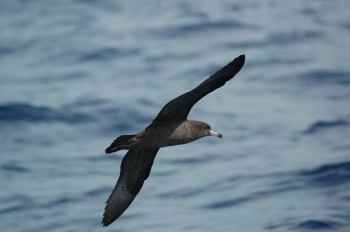Jennifer Lavers (Institute for Marine and Antarctic Studies, University of Tasmania, Battery Point, Tasmania, Australia) and colleagues have published on the globally Near Threatened Flesh-footed Shearwater Ardenna carneipes in Western Australia in the journal Bird Conservation International.
The paper’s abstract follows:
“Seabirds face diverse threats on their breeding islands and while at sea. Human activities have been linked to the decline of seabird populations, yet over-wintering areas typically receive little or no protection. Adult survival rates, a crucial parameter for population persistence in long-lived species, tend to be spatially or temporally restricted for many seabird species, limiting our understanding of factors driving population trends at some sites. We used bio-loggers to study the migration of Western Australian Flesh-footed Shearwaters Ardenna carneipes carneipes and estimated adult survival over five years. Western Australia is home to around 35% of the world’s breeding Flesh-footed Shearwaters, a population which was up-listed to Vulnerable in 2015. During the austral winter, shearwaters migrated across the central Indian Ocean to their non-breeding grounds off western Sri Lanka. Low site fidelity on breeding islands, mortality of adult birds at sea (e.g. fisheries bycatch), and low annual breeding frequency likely contributed to the low estimated annual adult survival (2011–2015: ϕ = 0.634-0.835).”

Flesh-footed Shearwater, photograph by Tim Reid
Reference:
Lavers, J.L., Lisovski, S. & Bond, A.L. 2018. Preliminary survival and movement data for a declining population of Flesh-footed Shearwater Ardenna carneipes in Western Australia provides insights into marine threats. Bird Conservation International doi.org/10.1017/S0959270918000084.
John Cooper, ACAP Information Officer, 05 September 2018

 English
English  Français
Français  Español
Español